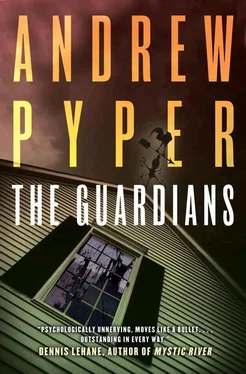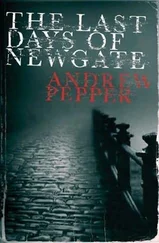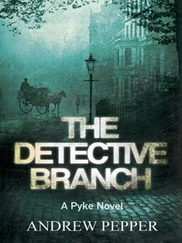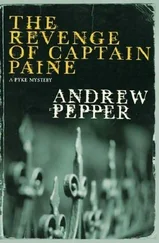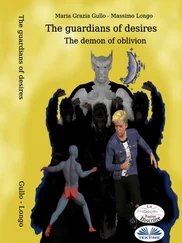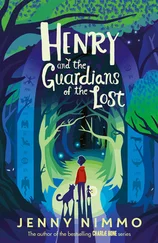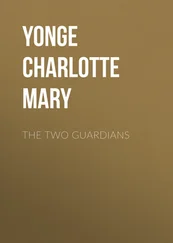Andrew Pyper - The Guardians
Здесь есть возможность читать онлайн «Andrew Pyper - The Guardians» весь текст электронной книги совершенно бесплатно (целиком полную версию без сокращений). В некоторых случаях можно слушать аудио, скачать через торрент в формате fb2 и присутствует краткое содержание. Жанр: Старинная литература, на английском языке. Описание произведения, (предисловие) а так же отзывы посетителей доступны на портале библиотеки ЛибКат.
- Название:The Guardians
- Автор:
- Жанр:
- Год:неизвестен
- ISBN:нет данных
- Рейтинг книги:3 / 5. Голосов: 1
-
Избранное:Добавить в избранное
- Отзывы:
-
Ваша оценка:
- 60
- 1
- 2
- 3
- 4
- 5
The Guardians: краткое содержание, описание и аннотация
Предлагаем к чтению аннотацию, описание, краткое содержание или предисловие (зависит от того, что написал сам автор книги «The Guardians»). Если вы не нашли необходимую информацию о книге — напишите в комментариях, мы постараемся отыскать её.
The Guardians — читать онлайн бесплатно полную книгу (весь текст) целиком
Ниже представлен текст книги, разбитый по страницам. Система сохранения места последней прочитанной страницы, позволяет с удобством читать онлайн бесплатно книгу «The Guardians», без необходимости каждый раз заново искать на чём Вы остановились. Поставьте закладку, и сможете в любой момент перейти на страницу, на которой закончили чтение.
Интервал:
Закладка:
Sometimes, after school, we would head up to Ben's bedroom, gather at his window and wait to watch her go by. She was renting a room at the nurses' residence up the hil on the hospital grounds ("No Male Visitors After 8 P.M.," a sign at the door declared). Most days she would take Caledonia Street, advancing with long strides up its slope, a leather satchel bumping against her hip. Alone.
When I think of the Thurman house now, what comes to mind isn't a horrific image or stab of guilt. Not at first. What I see before any of that is Miss Langham walking home along the sidewalk past its brooding facade. A juxtaposition of youth and poise against its clutching shadows. Her sure step, the hint of smile she wore even when no one was coming the other way to wish good day to. Heather Langham was al future. And the house possessed only the wet rot, the foul longing of the past.
This is how I try to hold her in place as long as I can, before the other pictures force their way through: Miss Langham clipping past Grimshaw's darkest place. It was, for al the moment's simplicity, an act of subtle defiance. We never saw her cross the street to pass it at a safer distance, as we ourselves did. In fact, she seemed oblivious to the house altogether. A refusal to acknowledge the rudeness of its stare.
But in this, of course, was the suggestion that she knew she was being watched. She was a woman already wel used to being looked at. Usualy, this looking inspired admiration and yearning in the observer. But we could sense that the Thurman house—or the idea of whatever inhuman thing lived in it—instead felt only bitterness. A reminder of its place in death and hers so vividly in life.
[3]
There are moments when the tremors disappear al on their own. Whole chunks of time when my body and I are reunited, warring soldiers clinking tin mugs over a Christmas ceasefire. I'l be looking out the window, and the hands that had been squeaking against the glass wil be calmed. Or now Sitting on the milk run to Grimshaw, the train starting away from the platform with a lurch, my heart giving enlarging shape to Randy's announcement of the end of things: Ben's dead, Trev. As we pick up speed, I can feel the closing distance between myself and the past, an oncoming colision my newspaper-reading and text-messaging felow passengers are unaware of.
And yet, I am stil. Silently weeping into the sleeve of my jacket but physicaly in control, my limbs awaiting their orders.
You can't help anyone, a voice suggests within me . You can't help yourself. Why not do what Ben did while you're still able ?
Not my voice, though it's instantly familiar. A voice I haven't heard in twenty-four years.
The train rols out from under the covered platform and the city is there, the glass towers firing off shards of sunlight in a farewel salute. Al at once, I'm certain I wil never come back. I escaped something in Grimshaw once. But it won't let me go a second time.
Ticket, please, the voice says, laughing.
"Ticket, please," the conductor tries again.
It was thought, when they built the four lanes running west between Toronto and the border at Detroit a couple years before I was born, that the highway's proximity to Grimshaw would lend new purpose to what was before then not much other than a service town for the county's farmers. But there was no more reason to take the Grimshaw exit than there had previously been to limp in its direction on the old, rutted two-lane. Like many of the communities its size on the broad arrowhead of farmland stuck between the Great Lakes, it remained a forgotten place. Never industrial enough to be outright abandoned in the way of the ghost towns of Ohio, Pennsylvania and Upstate New York, but not alert enough to attempt re-invention. Grimshaw was content to merely hang on, to take a subdued pride in its century homes on tree-lined streets, the stained facades of its Victorian storefronts, its daughters or sons who met with success upon moving away. Now, entering it as a stranger, one might see a gothic charm in the wilful oldness of the place, its loyalty to the vine-covered, the paint-peeled. But for those who grew up here, it was only as it had always been.
There are times of the year when certain places seem to be themselves more than any other time. Springtime in Paris, Christmas in New York. Toronto frozen at Valentine's. Even before the bad things happened, I saw Grimshaw as a Haloween town. Sparsely streetlit, thickly treed. The houses never grand but large, built at a time that favoured rear staircases, widow's-peaked attics, so that they al had their own secret hiding places. Founded by Scots Presbyterians and consistently conservative in the backbenchers it sent to Parliament, Grimshaw had little sympathy for the mystical. Any mention of the supernatural was considered nothing more than foolishness, the side effects of too many matinees indulged at the Vogue. Ghosts? "Catholic voodoo," as my father put it.
Yet at the same time, it was its dour Protestant character that endeared its inhabitants to the everyday tragic, to the stories of broken lives and cruel, inexplicable fate. For our parents, the dead lived on, but only in dinner-table and church-tea tales of misfortune.
Grimshaw's adults could never see their home as haunted. Their children, on the other hand, had no choice.
The train slows as we approach the town limits. The hardened fields yield to weedy outskirts, the low-rent acres of half-hearted development: the trailer park, the go-kart track, the drive-in movie screen with "See U Next Summer!" on the marquee (a promise that, by the vandalized look of things, has not been kept for a dozen years or more). Then the more permanent claims. Shaggy backyards crisscrossed with laundry lines. A school with paper witches taped to the windows. Dumpsters left open- mouthed, choking on black plastic.
Within a minute, we are roling into the old part of town at a walking pace. It gives us a chance to study the Inventory Blowout! offerings at what used to be Krazy Kevin's car lot, where Randy's dad worked, to catch a whiff of the fumes rising from the Erie Burger's exhaust. There is even a welcome party of sorts. Three kids smoking against the wal of the station, giving us the finger.
When the train stops I am alone in getting to my feet, hauling my bag off the rack and stepping down onto the platform. The cars already moving again, easing into the west end of town, where they wil pass the high school, the courthouse before speeding out onto the tobacco flats. Al places I'd rather view through double-paned glass. But now I'm here. The Grimshaw air. The midday moon staring down, bug-eyed and bored.
A gust blows a Big Gulp cup against my leg. Dust devils swirl over the platform, and within them, the laughing voice again.
Welcome home .
MEMORY DIARY
Entry No. 4
Randy was Howdy Doody-freckled, knob-elbowed and goofy-haired, but girls liked him. It was hard to know precisely what charms he possessed that got him into perfumed back seats and onto darkened basement futons more frequently than the rest of us. The easy answer would be his "sense of humour," which was how most of the girls who came and went, unblamingly, through Randy's teens would have explained it. But I'm not so sure. Yes, Randy was funny. But he was more of a joke than a comedian. Someone to be next to and feel that here was a felow who needn't be taken seriously. I think this is what girls saw in Randy, and stil do. He made the idea of two people being with each other for a time so much simpler than it was with anyone else.
Take Carl, for instance. Girls liked him too. In his case, it was a combination of good looks and a reluctance to speak that was often mistaken for an air of mystery.
Читать дальшеИнтервал:
Закладка:
Похожие книги на «The Guardians»
Представляем Вашему вниманию похожие книги на «The Guardians» списком для выбора. Мы отобрали схожую по названию и смыслу литературу в надежде предоставить читателям больше вариантов отыскать новые, интересные, ещё непрочитанные произведения.
Обсуждение, отзывы о книге «The Guardians» и просто собственные мнения читателей. Оставьте ваши комментарии, напишите, что Вы думаете о произведении, его смысле или главных героях. Укажите что конкретно понравилось, а что нет, и почему Вы так считаете.
